OGRESS vs. MAPMAKER: Battle of the Fantasies
Hello everyone and welcome to our (not so) highly anticipated BATTLE OF THE FANTASY post. Today Steven will represent THE LAST MAPMAKER by Christina Soontornvat and Emily will represent OGRESS AND THE ORPHANS by Kelly Barnhill.
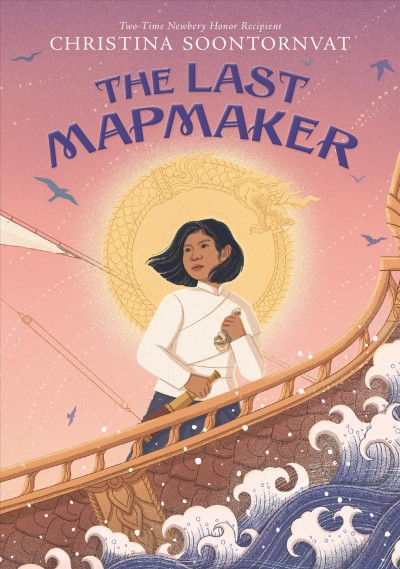
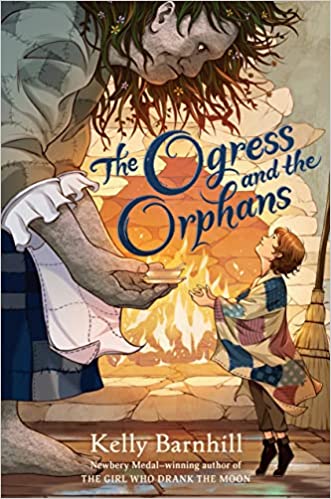
Steven and Emily have approximately 50 words to argue for their titles in each of the six theme categories (text examples do not count for words) and then it is up to you the reader to voice your opinions and vote for a winner in each category and overall.
ADVERTISEMENT
ADVERTISEMENT
NOTE: This is not at all how they do things on the actual committee and we will likely have both books on our final list, but this is a fun comparison exercise!
Opening Arguments
OGRESS: 400 pages of excellent prose, vivid description, dynamic characters and a fantastical plot that mirrors reality form a creative modern day fantasy classic. Barnhill smoothly uses multiple perspectives to convey a turn of events on a city that “used to be nice” and eloquently relays how heroes and villains may present differently than expected.
MAPMAKER: Sort of a classic adventure/fantasy, but one that feels unique and fresh. What seems like a straightforward story twists in surprising directions. Characters also turn out to be more than what they seem at first. The consistently engaging writing style relates events and introduces characters while leaving room for the reader to respond, react, and figure things out for themselves.
Interpretation of Theme
MAPMAKER: Individual ambition vs. honor, kindness, greater good: seen in Sai, but also Rian and Paiyoon. People are more complicated than they first appear: Rian of course, but also Mud, Boo, Grebe…; The devastation of war and conquest:
[Captain Sangra to Sai]: “…and what has it been for? So that we could make Mangkon into a great empire? An empire of cowards and thieves – that’s what we are…”
277
OGRESS: One may say the themes of questioning stereotypes, darkness in light, community, kindness and truth are overstated but I believe Barnhill deliberately overstated these themes to showcase how important they are. She wants the reader to “Listen” and constantly think about these themes throughout the book and connect them to each scene.
Books flew out the melting windows like panicked birds, their wings bright and phosphorescent. They were beautiful for a moment, the town remembers, the way a heart is beautiful in the moment before it breaks.
Development of a Plot
MAPMAKER: The setup for the voyage comes while we’re simultaneously learning about Sai’s world. Once on the ship, many small threads of tension: Sai’s secret work without Paiyoon’s knowledge; Boo as the stowaway; Sai’s exciting but dangerous alliance with Rian. Bo’s story did stretch plot credulity to a degree, though.
[Sai learning that she can join the voyage]: “A year away from Mud and Catfish. A year away from the Fens. I had been saving my money for a ticket away from my life, and here was a free ride.”
53
OGRESS: Layers and perspectives contribute to the larger plot: what happened to the town and why. And the smaller plot, who are these characters (especially the orphans), what are their individual journeys and how they impact this town. It all melds together, but not too predictably or cleanly.
Stone-in-the-Glen had been famous for its trees. Shade trees in parks, blossoming trees in the walkways. Fruit trees lining the neighborhood streets, with limbs that bent under the weight of an abundant harvest season.
The people in town watched in sorrow as tree after tree came down. And with the trees died the shade. The light in Stone-in-the-Glen became a constant searing whiteness and difficult to bear. People squinted to look at one another, their faces creased into permanently angry expressions.
Delineation of Setting
MAPMAKER: Sai’s world on An Luang is described vividly; and also the social constructs that are so important to her story (and Lian’s). Readers learn just enough about the wider world and its history, and it comes effortlessly through Sai’s narrative voice and the dialogue she relates..
In a place this serene, how could anyone believe we were going back to war? After two decades of fighting every neighbor in striking distance, the Kingdom of Mangkon was bigger and stronger than ever. We finally had peace. We had security. It meant I actually had a good job for once. (8)
OGRESS: Setting is the strongest part; displayed through vivid descriptions of the town then and now, the food the Ogress makes, the Orphan house, the Ogress’s home and of course the literal stone, or now pile of junk. You feel as if you are walking the drab town streets and tasting the delicious food.
The stone sat just off to the side of the center square. It was, and is, rough and asymmetrical and rather drab in color. It wasn’t a stone that announced itself, it just blended in. It didn’t seem at first glance to be that large a stone- perhaps the size of a comfortable chair but in truth it was much bigger than it seemed as much of the bulk extended deep under the earth and extended in many directions. How deep? How wide? Well no one could say.
Delineation of Characters
MAPMAKER: Sai is at the center: we root for her, but can see how her ambition and sense of resentment can lead her astray. Others are all more than they seem at first: Sai gradually sees some good in Grebe and Mud. We can see how appealing Rian appears, but her emergence as a villain is convincing.
[Sai realizes her father is a better person than she had realized]: “I was speechless. I felt like someone had taken a spoon and swirled it inside my brain, until everything I thought I knew was turned completely upside down”
294
OGRESS: We are taken through a full character arc of EVERYONE: the ogress, the crows, the mayor, the orphans (individually and as a whole) the townspeople (individually and as a whole) and the matron and her husband. We see the anatomy of becoming a hero, how there is not just one hero and begin to understand how people can become “bad or good.”
“I would like nothing more than to tell you that every person—human, dragon, or any other kind of creature—is fundamentally good. But I can’t tell you that, because it is not in my nature to lie. Everyone starts fundamentally good, in my experience, and nearly everyone stays mostly good for the most part. But some . . . well. They choose to do bad things. No one knows why. And then a small number of those choose to stay bad. I wish it weren’t true. But it’s best you know.”
Appropriateness of Style
MAPMAKER: Sai narrates with a consistent “show don’t tell” approach. She doesn’t describe what her feelings are, but we learn what they are from her actions. Text is mostly dialogue and Sai’s current observations, providing a sense of immediacy that brings readers right into each scene.
[Sai, filled with resentment about class limitations]: “Good little Mangkon children were taught to say the royal motto whenever we walked through one of our city’s gates, as a reminder that we are the living links to our past. I stared up at the wooden dragon, my lips shut tight. And then I walked into the darkness, heading for home.
OGRESS: An unknown narrator is present throughout the novel who converses with the reader, asks questions and makes you think. The repetition of “Listen,” and the rhetorical questions are preachy, but it works for book’s purpose: to look differently at people and events and to work together as a whole.
We can choose to be filled with suspicions, or we can choose to accept grace, and then continue to extend kindness to others. Which do you choose?”
Presentation of Information Including Accuracy, Clarity, and Organization
MAPMAKER: Told from Sai’s point of view, in past tense but though she’s telling after the fact, she stays in the moment: no foreshadowing or analysis from her now-wiser self. She rarely judges her actions, like betraying Paiyoon or swallowing Rian’s lies, but lets the reader figure things out.
Sai faced with a choice about forging the Captain’s writing: “I stared down at Rian’s outstretched hand. A familiar bitterness had started to fill my mouth. It took me a moment to realize it was the same feeling I’d had that night in the Fens when Mud and Catfish had me to forge a letter for them.”
246
OGRESS: Barnhill takes a lot of risks with this book: asking rhetorical questions, commanding the reader to “listen,” speaking from the perspectives of crows, a mysterious narrator and even a stone. These are all decisions that will appeal to the child audience who the Newbery award is for.
Caw, the crows said. People have said that this is a good town. And maybe it was once. And maybe there is still goodness somewhere. And loveliness somewhere. But there is an unkindness that grows every day. It spreads the way the blight spread through the trees. If a town can be so unkind as to throw rocks at crows, what else are they capable of?
Weaknesses of Opposing Book
EMILY ON MAPMAKER: Many aspects of the book and criteria were underdeveloped, especially the characters who were very one dimensional, leaving the reader with a lot of questions. The pacing was staggering and uneven with a very quick beginning and end while the middle dragged on.
ADVERTISEMENT
ADVERTISEMENT
STEVEN ON OGRESS: Overstated themes. Anthea’s “what is a neighbor? sign idea was ineffective. They still had to write yet another book to answer that question because the townspeople couldn’t think for themselves. It also spelled out the novel’s themes. The townspeople (and the readers) could have figured that out for themselves.
Closing Arguments
CLOSING ARGUMENTS
OGRESS: An excellent modern day fantasy that takes the typical tropes, spins them upside down and encourages young readers to think critically. OGRESS excels in all six of the Newbery criteria and children will resonate with this title.
MAPMAKER: A large-scale adventure set in a fully realized world, built around a compelling lead character who is flawed, but also admirable. Deeper themes of what it means to be a hero and the impact of colonialism emerge seamlessly as part of the story and character development.
Now readers it’s time for you to vote. Based on the above points you can vote for a winner in each category and an overall winner. You’re welcome to add your own opinions on each of the categories too! Please submit ballots in the comments.
BALLOT:
THEME:
PLOT:
SETTING:
CHARACTERS:
STYLE:
PRESENTATION:
OVERALL:
Filed under: Book Discussion, Heavy Medal Mock
About Emily Mroczek-Bayci
Emily Mroczek (Bayci) is a freelance children’s librarian in the Chicago suburbs. She served on the 2019 Newbery committee. You can reach her at emilyrmroczek@gmail.com.
ADVERTISEMENT
ADVERTISEMENT
SLJ Blog Network
The Shockingly Good Children’s Poetry of 2025
Magda, Intergalactic Chef: The Big Tournament | Exclusive Preview
When Book Bans are a Form of Discrimination, What is the Path to Justice?
ADVERTISEMENT



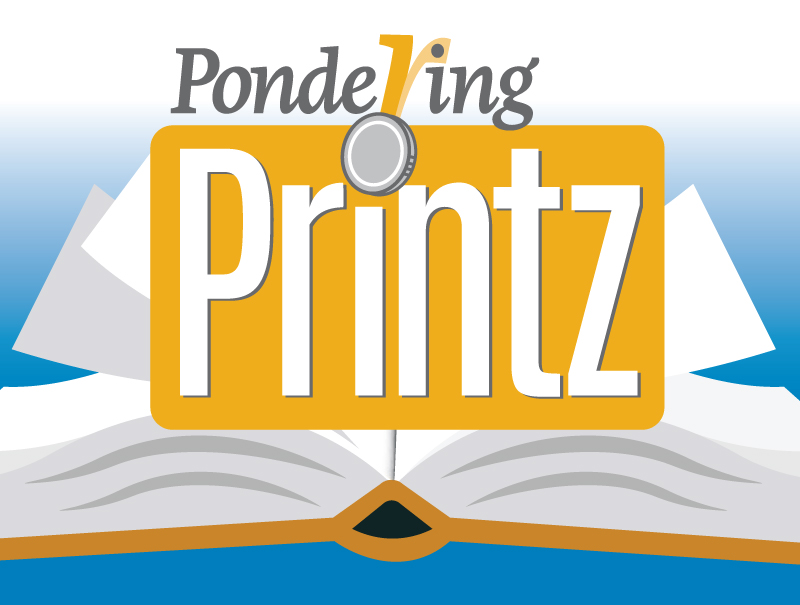
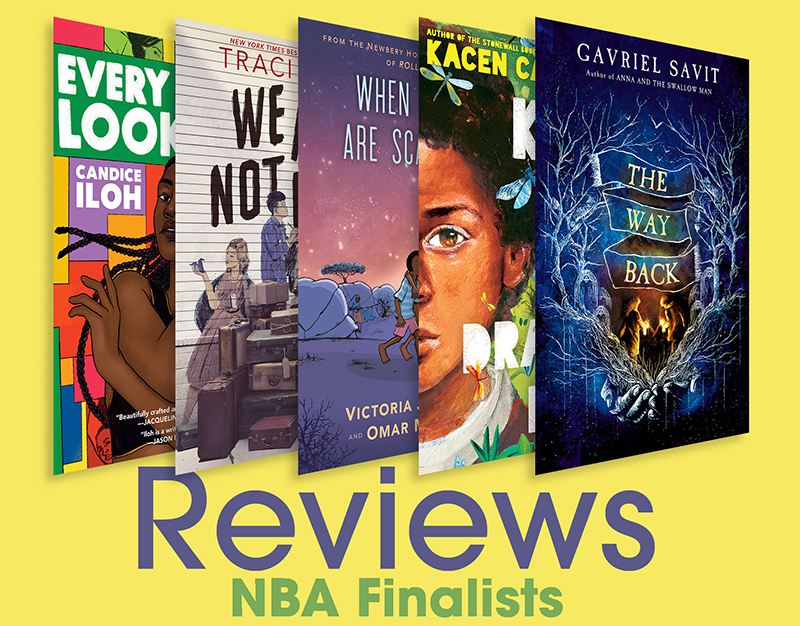
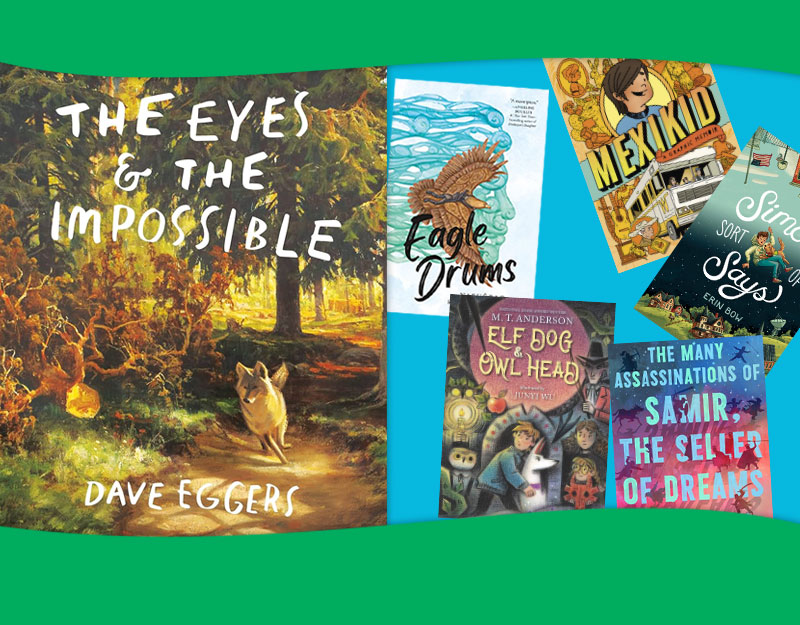
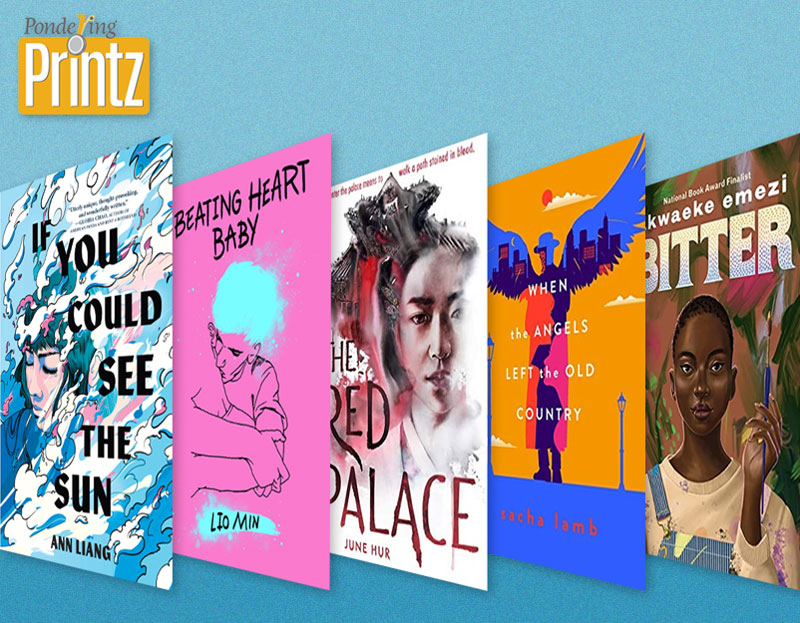

I’ll vote first as an example:
THEME: OGRESS, intentionally overstated and important.
PLOT: MAPMAKER, unique twists and turns well written
SETTING: OGRESS, amazing descriptions and attention to detail
CHARACTERS: OGRESS, full blown character arcs of EVERYONE
STYLE: MAPMAKER, “show don’t tell” makes you think
PRESENTATION: OGRESS, tries a lot of unique variations that work
OVERALL: OGRESS, I mean duh!!
Okay, I’ll vote too. This was harder than I thought it might be:
THEME: MAPMAKER: woven into story’s development rather than force-fed
PLOT: MAPMAKER: strong forward movement, with surprises
SETTING: OGRESS: the town and Ogress’ home almost characters in themselves
CHARACTERS: OGRESS: distinct and original, especially the Ogress
STYLE: MAPMAKER: Smooth, purposeful prose without a wasted word
PRESENTATION: OGRESS, playful, creative, sometimes surprising
OVERALL: MAPMAKER, but barely. Rereading gave me greater appreciation for both books, though I still feel that neither is perfect (and then I remind myself that “perfect” is not part of the Newbery criteria…)
This is so hard! They are both very good books.
I have wrestled with Ogress ever since I read it because of the didactic tone in certain areas. However, taking the whole picture into account, I must say that Ogress has remained in my mind more than Mapmaker. I loved Mapmaker very much, but considering it along with Ogress makes the latter title stand out more in my mind. I have only read each of these titles once, though.
If these are the only two fantasy titles you are considering for the final list, (I mourn for The Patron Thief of Bread, but I understand), then I will vote for Ogress because of the setting, presentation of themes and, with a bit of misgiving, for the characters. They are all vivid and distinct, even the one I cannot take seriously! Ha!
Very good post.
These aren’t necessarily the only two fantasy books that will be on our final list. (and BLACK BIRD, BLUE ROAD is there already). We just chose to highlight them because it seems like a lot of people have read them, and both have received support and questions on the blog over the last couple months. And to offer another example of how difficult (and interesting we hope) it can be to compare and contrast two highly accomplished books…
Overall: Mapmaker. I’ll just address the two elements that I think are most pertinent:
Theme: Mapmaker. Mapmaker leaves readers space to draw their own conclusions about the big ideas it raises (exploration, colonialism, honor, ambition). As for Ogress, in my opinion overstating the themes and being preachy is not Newbery-worthy. I think it doesn’t show respect for children’s understandings, abilities, and appreciations. I always dislike it when books hit the reader over the head with the message. This kind of storytelling leaves very little room for the reader to create their own meaning. Is this book making the reader think or telling the reader what to think?
Characters. Mapmaker. The characters have nuance and complications — the reader might have conflicting feelings about them because the characters realistically have a mix of good and bad intentions. Compare that to a story where the Mayor is 100% bad and the Ogress is 100% good. (Side note for Patron Thief readers: she is so similar to Griselda Baker!) For me, the most interesting characters in OGRESS were the matron and her husband. I really felt for them.
Overall: OGRESS. I see what people are saying about it being somewhat preachy, but it really has a fable-like feeling to me and the tone feels appropriate for that type of story. I can certainly see the kid appeal of MAPMAKER and I do think it has a better plot than OGRESS, but OGRESS is still the winner to me, and stands out in my memory a lot more when I think over my reading in the past year.
Good point, Mr. Stephen. THey are both indeed very accomplished books. And, yes, I didn’t think about Black Bird. SOrry. Thanks for the reminder.
I can’t play this game sadly, not having yet read MAPMAKER.
I do want to make a comment about the preachiness of OGRESS, which multiple people have mentioned. I wonder, just as you can’t award for didactic intent, whether we can’t penalize it either, as long as literary quality is high. I think a sermon is a form that inherently tells not shows. But a sermon can be literary. A sermon can be a deeply transporting and life-changing, even for children. With respectful disagreement to Destinee, sometimes as a reader I like being overwhelmed with fervor, to be hit over the head with conviction. And this is how I read OGRESS. What is this, if not a sermon?
“You have a responsibility to be grateful. You have a responsibility to do good as a result. Be good and do good.”
Yes preachy. Yes unsubtle. But reading this felt like religious inspiration. So I wonder if what people are disliking about this book is really about quality. Sermonizing is just what this book does, and the question is whether it’s literary or not. There are dull sermons to be sure amongst children’s books. But though I do find some imperfections in OGRESS, I think it’s the work of a great author whose writing feels to me akin to, say, the praise poems of Gerard Manley Hopkins (or more relevant, Kate DiCamillo). So I personally give high marks in some of the Criteria people are dinging it: appropriateness of style (given what I think the author was setting out to do) and interpretation of theme.
Sarah notes the “fable-like feeling” of OGRESS and Leonard sees it as “a sermon.” Both comments help to remind us that when the author is being preachy, it’s by intention, not mistake. And the writing style, the tone, and the storytelling approach all support that that intention. WINDSWEPT does some similar things with its storyteller’s voice, though I don’t think it works as well.
BLACK BIRD, BLUE ROAD does it a little differently, using a distinct storyteller’s voice to open each section and present the tale as a grand, magical legend, but then shifts to a more direct voice for the main narrative. I thought that was highly effective. BLACK BIRD has a bit of the playful narrative style of OGRESS, but also the more high adventure voice as in MAPMAKER…a tricky thing to pull of successfully.
.
This is an excellent point–it makes a difference whom the reader attributes preachiness to. The line I quoted above is spoken by the cobbler’s wife. I am OK with such admonitions coming from her, or a rock, or a cat: “‘stop worrying whether or not you are a good person. If you wish to be good, do good.’ Which would be a strange thing for a cat to say” (212). I like it less when it is baked into the worldbuilding, which is how I read WINDSWEPT. This makes me realize a personal bias. I don’t like the appearance of choice when, as far as the author is concerned, there is a “right” choice. In that case, I prefer the author or credible surrogate to just tell me what they think. This affects my own judgment of the “respect” Term/Criteria. But I completely respect the opposite opinion, such as Destinee preferring when a book “leaves readers space to draw their own conclusions.”
I liked BLACK BIRD at first, but liked it less as I went on. I now think one reason is how the “lesson” is baked into Ziva in a way not completely tethered to her adventuring. To me she felt one-note–lots of reiterating I’m-not-listening-to-anyone-else-I-know-I’m-right-my-brother-is-the-one-privileged-person-who-should-get-to-cheat-death-because-I-just-know-he’s-going-to-cure-leprosy. Steven’s description now makes me think that I would have preferred musings about fate and death and acceptance in the narrator interlude sections (if at all) and just let the characters have their adventure in the main narrative without repeatedly pulling over to talk about why Ziva should or shouldn’t be doing this.
I had a somewhat similar issue with RECTANGLES. Again I felt the preachiness was incorporated into a character, the protagonist Mac, who like Ziva is convinced he knows truth and isn’t shy about telling us what it is. I think it affects my reading that in both these books these characters are the main protagonists. I know I said before that I preferred the author or surrogate “to just tell me what they think.” But I am also the kind of reader who wants to project myself into the protagonist. It’s OK for a cat to moralize to Bartleby, but I am put out by Mac moralizing to me, because Mac is the character I instinctively want to be my stand-in. Thinking this through, I realize I am perhaps over-indoctrinated by Joseph Campbell archetypes. I’ve internalized a categorization of there being hero characters and mentor characters. It is the mentor’s role to overtly educate the hero, but it feels weird to me when the hero is doing it.
I keep coming back to HEALER AND WITCH and Martin’s speech. This is another sermon read-alike. “Every person on this earth is unique, with special God-given gifts that are meant to be used.” But I’ve argued elsewhere that it is so effective because of its framing as a recitation, as a voice from the grave, from someone you otherwise would not have expected to say these things. And that makes a big difference. I am sure as a reader I would have literary irritation if instead Martin just suddenly became Mac.
I haven’t read the Last Mapmaker yet so I can’t choose between the two yet. While I have read other books this year that I have really enjoyed, Ogress has just really stuck with me and I think your comment about intent is really important. As others have mentioned, the characters in Orgress do not have a lot of depth, but I do not see that as a flaw or mistake. Kelly Barnhill was writing a book with a message, and it seems that every choice she made in Ogress is to make that message stand out.
Just finished THE DOOR OF NO RETURN, and I think it’s worth including in this discussion. It’s structured exactly like WINDSWEPT and BLACK BIRD, with its storyteller interludes. It has its share of exhortations about “how to be” from characters like Mr. Goodluck Phillip, Nana Mosi, and especially Afua, the most emotionally heightened but perhaps convenient. Afua is my one small immediate reservation about this book, but I will likely nominate this for December.
This is really hard to do, because these are both excellent books. Both deserve a place at the table when discussing the Newbery. When looking at two excellent books, I have to get picky.
Theme: Last Mapmaker does a better job of having the theme feel more organic to the story. Both had clear themes that were well expressed.
Plot: Last Mapmaker surprised me more. Both did a good job with a plot that moved and was easily followed.
Setting: Ogress was the clear winner. The writing was very expressive and clearly helped me realize where and when we were.
Characters: Last Mapmaker was the clear winner. I felt like the mayor was a stereotype villain in the Ogress. This was one of the biggest problems that I had with this book. Last Mapmaker did have some characters that did not get complete and full stories, but they were not in the story long or important to the story.
Style: Ogress had more of an old fashioned storytelling vibe that I enjoyed.
Presentation: Last Mapmaker was much better edited. The story had no wasted storylines that went nowhere or extraneous ideas. Clear and concise storytelling.
Overall: I really enjoyed the Last Mapmaker more, but not by much. Both stories are excellent.